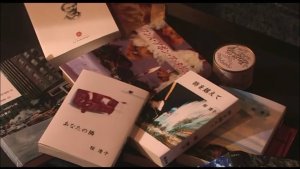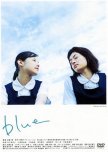This review may contain spoilers
~ Story & Cinematography
Two adolescent girls both uncertain of what they want, found each other and fell in love. It tells the experience of pain that comes with it - to give space when troubled, to overcome, and make things settle. Unlike common tropes, their relationship is not bound by the harshness of society.
With wide frames of rural sceneries, there were also not well-lighted scenes depicting the lonely lives of the characters and distant shots of interactions capturing body language (like when Nakano was talking to Kirishima about Endo, I believe that moment Kirishima spinned around the bar was a sign of frustration) which made the cinematography and directing interesting but also plain, in general. Not to mention the long, slow, quiet scenes that could be shorten. In opening alone, it took 4 minutes before the first dialogue was uttered. I was actually fine with those except this one thing I find unnecessary (a full-minute screentime of brother checking and disposing the grapes).
When it comes to favorite, I choose that seashore confession scene. No close-up shots, yet it captivates the raw emotions. I like the way Endo was waiting for Kirishima to say it. Kirishima struggled but the moment she said it, Endo smiled implying that she confirmed it. And when Kirishima broke down, Endo assured her she liked what she said and that she's happy - for me, that moment was just beautiful.
~ Acting & Characters
What I like about Konishi Manami is her strong feminine vibe. She delivered the character well. While both leads are conflicted, I still find Endo more difficult. Her character seems carefree and confident, but deep inside, she’s a mess with secrets and insecurities. Behind her happy disposition lacks qualities that led her to conform to her lover’s interests, even though it doesn’t inspire her. She holds on to those to feel a sense of value. In fact, the scene where she went off with the guy, you can notice the change in her look. She suddenly had this fear on her face, worried how the meeting would end up. That low self-esteem prevents her from reciprocating Kirishima’s affection in the same way. However, she still gave warmth, and even (indirectly) got her something motivating for the future.
In my eyes, Ichikawa Mikako has this androgynous beauty with distinct features suitable for a cool character (although that wasn’t the case here in the beginning). Kirishima had a dull, reserved attitude contrary to Endo. She might just be fascinated with Endo at first, but as she learned things about her, Kirishima’s attraction grew more, and still, she never judged her. Most importantly, when she got hurt, she reflected about it, and when she regained herself, she tried to fix things.
The leads have natural chemistry together and each has their own charm. One was left hopeful, but at least, that person proceeded on what she needs to do even if it means they would be in different paths.
~ Music
Soundtrack was only used to emphasize certain moments. It might be boring or unappealing to some, but personally I don't mind it.
Overall, Blue is a bleakish tale with work of subtlety. Everything was kept in minimal, and I appreciate that filming style. It’s not something I see often so I got myself caught up.
Two adolescent girls both uncertain of what they want, found each other and fell in love. It tells the experience of pain that comes with it - to give space when troubled, to overcome, and make things settle. Unlike common tropes, their relationship is not bound by the harshness of society.
With wide frames of rural sceneries, there were also not well-lighted scenes depicting the lonely lives of the characters and distant shots of interactions capturing body language (like when Nakano was talking to Kirishima about Endo, I believe that moment Kirishima spinned around the bar was a sign of frustration) which made the cinematography and directing interesting but also plain, in general. Not to mention the long, slow, quiet scenes that could be shorten. In opening alone, it took 4 minutes before the first dialogue was uttered. I was actually fine with those except this one thing I find unnecessary (a full-minute screentime of brother checking and disposing the grapes).
When it comes to favorite, I choose that seashore confession scene. No close-up shots, yet it captivates the raw emotions. I like the way Endo was waiting for Kirishima to say it. Kirishima struggled but the moment she said it, Endo smiled implying that she confirmed it. And when Kirishima broke down, Endo assured her she liked what she said and that she's happy - for me, that moment was just beautiful.
~ Acting & Characters
What I like about Konishi Manami is her strong feminine vibe. She delivered the character well. While both leads are conflicted, I still find Endo more difficult. Her character seems carefree and confident, but deep inside, she’s a mess with secrets and insecurities. Behind her happy disposition lacks qualities that led her to conform to her lover’s interests, even though it doesn’t inspire her. She holds on to those to feel a sense of value. In fact, the scene where she went off with the guy, you can notice the change in her look. She suddenly had this fear on her face, worried how the meeting would end up. That low self-esteem prevents her from reciprocating Kirishima’s affection in the same way. However, she still gave warmth, and even (indirectly) got her something motivating for the future.
In my eyes, Ichikawa Mikako has this androgynous beauty with distinct features suitable for a cool character (although that wasn’t the case here in the beginning). Kirishima had a dull, reserved attitude contrary to Endo. She might just be fascinated with Endo at first, but as she learned things about her, Kirishima’s attraction grew more, and still, she never judged her. Most importantly, when she got hurt, she reflected about it, and when she regained herself, she tried to fix things.
The leads have natural chemistry together and each has their own charm. One was left hopeful, but at least, that person proceeded on what she needs to do even if it means they would be in different paths.
~ Music
Soundtrack was only used to emphasize certain moments. It might be boring or unappealing to some, but personally I don't mind it.
Overall, Blue is a bleakish tale with work of subtlety. Everything was kept in minimal, and I appreciate that filming style. It’s not something I see often so I got myself caught up.
Was this review helpful to you?


 1
1 3
3





















